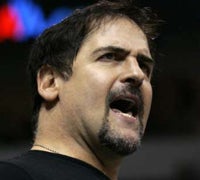 |
Dallas Mavericks owner Mark Cuban Source: Reuters |
SAN FRANCISCO — Why would billionaire entrepreneur Mark Cuban want to go on the ABC show “Dancing with the Stars”?
Because it “was fun, it was a challenge, and on top of that, I just got my hip replaced, so I could either go to a big fat guy called Bruno for rehabilitation or I could go dance with Kym,” the owner of the Dallas Mavericks basketball team replied, referring to show veteran Kym Johnson. “Bruno, Kym, Bruno, Kym. You decide.”
In a keynote interview yesterday at TechCrunch50 with Internet entrepreneur Jason Calacanis, formerly the CEO of blog publishing network Weblogs, Cuban covered a series of topics ranging from his life and his business dealings to advice for would-be entrepreneurs. TechCrunch50, being held at the San Francisco Design Center Concourse, ends today.
After selling his first company, systems integrator MicroSolutions, for $6 million to CompuServe and retiring at the age of 32 in 1990, Cuban bought a “lifetime pass” from American Airlines, he says. “My goal was to go to as many countries as I could and drink with as many people as I could that I could remember,” he told the packed room.
In 1995, fellow Indiana University alumnus Todd Wagner, like Cuban a college basketball fan, dragged him out of retirement to help build up Indiana basketball. “I was like, ‘Dude, I’m retired, I don’t have to work for the rest of my life,’ but he bugged me,” so Cuban set up a company, Audionet, “bought a $1,500 Dell computer, got a DSL line, downloaded everything onto it in my bedroom and started live streaming,” he said.
Audionet was renamed Broadcast.com in 1998 and sold to Yahoo for $5.9 billion in Yahoo stock in 1999, during the dot-com boom. Set for life, Cuban went into movies and other ventures and bought the Landmark theater chain because “I’m a competitive junkie,” Cuban said. “I’m not a skydiver adrenalin junkie, I’m a business adrenalin junkie.”
“I wanted to do something people said couldn’t be done,” Cuban recalled. So when the Fox Network turned down his proposal to switch to high-definition television (HDTV), he co-founded HDNet with Philip Garvin, then founder and owner of Colorado Studios, in 2001.
Restructuring movie distribution
Cuban then turned his attention to the movie business. “Traditionally, movie releases consist of putting the movie out and just praying,” he said. That’s not controlling your destiny.” So he set up 2929 Entertainment with longtime partner Wagner to provide vertically integrated production and distribution of films and video.
Through 2929, Cuban puts new movies into video on demand format and sells those to the cable and satellite companies. They advertise the movies heavily “so we get $1 million to $2 million of free advertising, then we put the movies in the theaters and they do very well,” he said.
That does not sit well with the traditional distribution network, and National Association of Theater Owners President John Fithian “called me the Devil” and “the head of Sony Pictures Classic said [his putting out new movies as videos on demand] is the worst thing that could happen,” Cuban said. “I’m just a bad guy, I guess, but this could save independent film,” he added.
Even his well-publicized battles with the National Basketball Association (NBA), which has fined him millions of dollars for his outbursts, had a purpose. “They’re coming over to me now,” Cuban said. “A lot of these things, I was right, and now they’ll make changes, and that’s why I’ve been quieter because now they’ll listen.” He used to erupt before because “nobody was listening and the only way I could protect my investment was being loud about it.”
Cuban thinks today’s entrepreneurs are being cheated because of the changing approach to business. Instead of making sure a company is profitable before going public, now “you get the front page news and you’ll figure out the model,” he said.
Entrepreneurs should talk about the bottom line, not the top line,” Cuba said, adding that he would not invest in a company that comes to him with an exit strategy. “I want a cash-in-pocket strategy,” he said.
Asked for the best piece of advice he could give a young entrepreneur, he harked back to a 60 Minutes interview of Bobby Knight, formerly head basketball coach at Indiana University. “He said everybody has the will to win, but not everybody has the will to prepare,” Cuban said.
“You have to be the smartest guy in the room about your product, you have to be prepared to kick your own a**,” Cuban said. “Then from there you have to be able to have a revenue source. The third thing is, make sure you love what you’re doing.”


